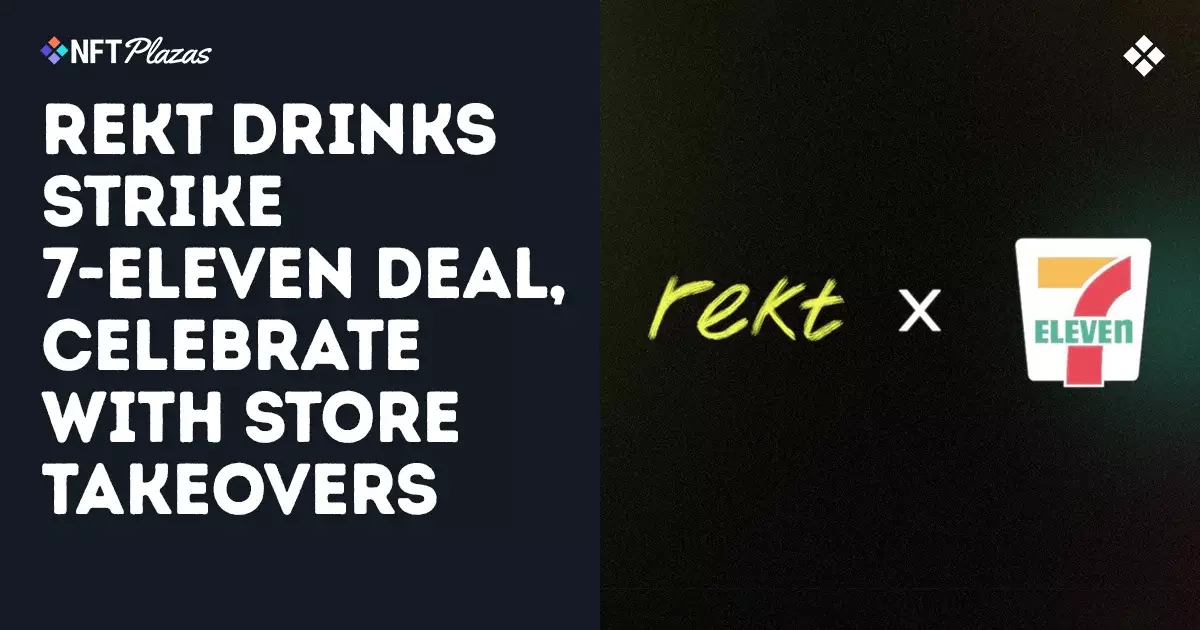What happens when the worlds of cryptocurrencies, NFTs, and everyday consumer products collide? Enter Rekt Drinks, a company that has rapidly ascended the ranks to partner with the world’s largest convenience store chain, 7-Eleven, within a mere eight months of existence. While this partnership might seem like a beacon of entrepreneurial success, there are underlying concerns that warrant scrutiny. The spectacle surrounding their launch—as showcased by exclusive DJ events and elaborate marketing-to-consumer tactics— highlights a troubling trend in today’s corporate landscape.
The NFT Gimmick: Sustainable or Short-Lived?
On the surface, Rekt Drinks’ integration of NFTs into their beverage releases appears innovative. Each can explosively marketed through exclusive drops, losing inventory at breakneck speeds, harnesses the power of scarcity—an attractive trait for today’s collectors. However, is this approach sustainable? As more brands adopt similar tactics, the novelty of NFT-linked products is likely to wear off. Consumers may soon tire of the gimmick, resulting in considerable fallout for a brand so heavily reliant on it. By tying their entire identity to the volatile NFT market, Rekt Drinks risks not only brand erosion but also financial instability.
Perils of Hype Culture
The enthusiasm surrounding Rekt Drinks is palpable. Their celebration through three consecutive store takeovers in Los Angeles—with electrifying DJ performances—creates a carnival-like atmosphere that attracts attention. However, the shallow nature of this hype culture cannot be ignored. Such practices prioritize short-term buzz over long-term customer loyalty. If consumers purchase out of excitement rather than genuine interest or need, the company could face a mass exodus when the next shiny object appears on the market.
Market Saturation: The Inevitable Collapse
With dreams of expanding their reach beyond the U.S., it begs the question: how many brands can the market bear? Rekt Drinks is entering a cutthroat space, where many beverage companies are already entrenched. The convenience store aisle isn’t just a patch of gold waiting to be mined; it’s a battleground dominated by established brands with significant market share. Should Rekt Drinks fail to capture consumer interest consistently, it could face the harsh reality of market saturation, leading to steep declines in demand.
The Dark Side of DRANK Points
The reward system incentivizing purchases through DRANK points sounds appealing initially. Yet, one must question how this system truly benefits the consumer. Is it genuinely rewarding, or merely a clever tactic to bind consumers into a cycle of perpetual consumption? Moreover, the complexities of this kind of loyalty system often alienate casual customers who prefer straightforward purchasing experiences over convoluted point systems. The risk here is that Rekt Drinks could inadvertently craft an exclusionary consumer base that feels disempowered.
Brand Identity Crisis: The Faux Authenticity
As much as Rekt Drinks seems to embody a youthful, underground, tech-savvy spirit, one must probe the authenticity of their brand identity. Much of their appeal stems from an image carefully cultivated through influencers, hype, and high-energy events. This branding can quickly swing from trendy to disingenuous if consumers perceive it as merely a marketing ploy. In an era where honesty and relatability reign supreme, businesses need to tread carefully; any misstep could spell disaster.
Impact on the Drinking Culture
Finally, let’s delve into a sociocultural critique. The partnership with 7-Eleven raises pressing questions about the type of drinking culture being fostered. Is it promoting responsible consumption or merely encouraging a hyper-commercialized, instant-gratification mindset? With increasingly blurred lines between alcohol and non-alcoholic beverages laced with high-stakes digital currency, it runs the risk of trivializing responsible consumer behavior.
While Rekt Drinks is undeniably an exciting player in the market, their trajectory is laced with pitfalls that could undermine their innovative spirit. By questioning the efficacy and ethics of their approach, we can be more vigilant consumers in an ever-evolving marketplace driven by flashy tactics rather than genuine values.


Leave a Reply